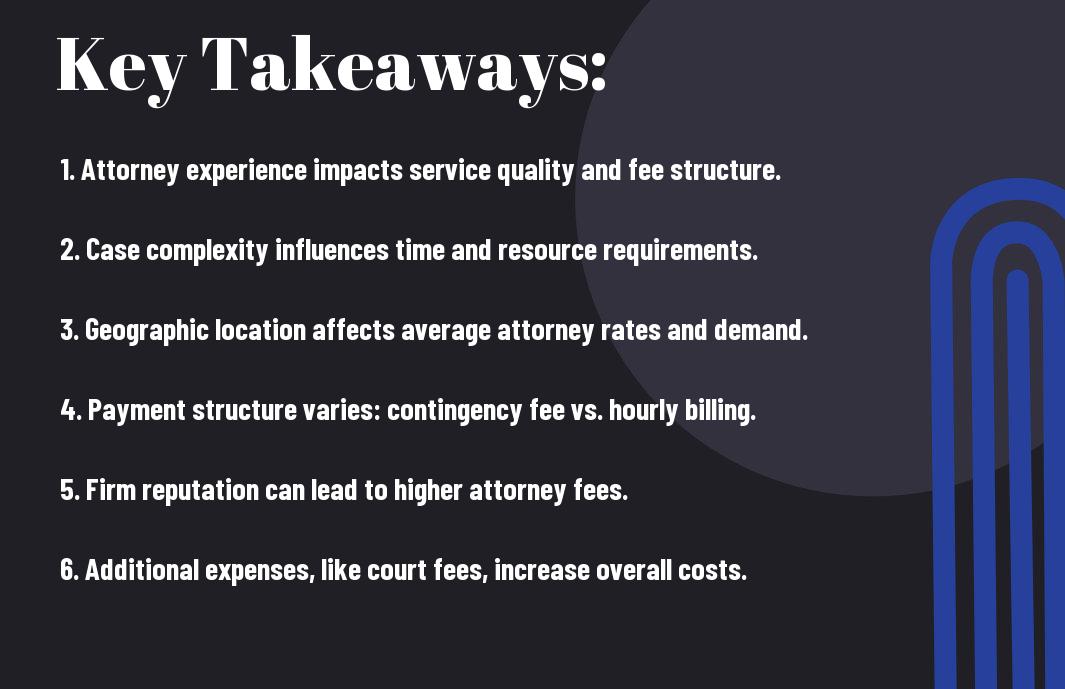
What Intricate Variables Determine The Cost Of Hiring An Accident Attorney?
You may be wondering what intricate variables affect the cost of hiring an accident attorney. Understanding these factors is imperative for making informed decisions when it comes to legal representation. The experience level of the attorney, the complexity of your case, and the geographic location of their practice all play significant roles in determining fees. Additionally, you should consider whether the attorney charges a contingency fee and how this may influence the overall cost. By being aware of these factors, you can better navigate the hiring process and safeguard your financial interests.
Key Takeaways:
- Experience Level: The attorney’s years of practice and expertise in handling accident cases can significantly influence their fees.
- Case Complexity: More intricate cases, involving severe injuries or multiple parties, often require more resources, leading to higher costs.
- Geographic Location: The cost of hiring an accident attorney can vary based on the region, with urban areas typically seeing higher rates due to increased demand and living costs.
Factors Influencing Attorney Fees
While seeking the right legal representation, understanding the factors that influence attorney fees is important to make an informed decision. Various elements contribute to the overall cost, including your case’s complexity, the attorney’s experience, and regional market trends. Here are some key factors to consider:
- Experience and expertise of the attorney
- Location and market conditions
- Case type and its expected duration
- Support staff and office overhead
- Billing structure (hourly vs. contingency fee)
After understanding these factors, you can better evaluate the potential costs involved in hiring an accident attorney.
Experience and Expertise
An attorney’s experience and level of expertise can significantly affect their fees. Generally, those with more years in practice or specialized knowledge in accident law will charge higher rates, reflecting their established reputation and success record. You might find that hiring an attorney with a proven track record in similar cases could lead to a better outcome, justifying the higher fee.
Moreover, attorneys who are board-certified in personal injury law may command a premium for their services due to their advanced qualifications. When weighing the cost of representation, consider how the attorney’s experience can impact your case and whether their expertise is worth the investment for your situation.
Location and Market Conditions
About where you live can play a significant role in the cost of hiring an accident attorney. Rates can vary dramatically between urban and rural areas, as well as across different states. Metropolitan regions often have higher living costs, leading to attorneys establishing premium fees. Conversely, in smaller towns, fees may be more affordable, but that also may affect the attorneys’ availability and their experience with complex cases.
Factors such as the competitiveness of the local market and the demand for legal services also play a role in determining pricing. For example, if there are many attorneys in a community vying for clients, this could drive prices down, while areas with limited legal resources might see inflated fees. Additionally, attorney rates can be influenced by the prevailing economic conditions, making it important to research your local market to gauge what you might be expected to pay for quality legal representation.
Fee Structures in Personal Injury Law
Some of the most common fee structures in personal injury law include contingency fees, hourly rates, and flat fees. Understanding these various pricing models can significantly impact your financial outcome after an accident. Each structure has its own advantages and challenges that you should carefully consider before choosing an attorney. While some attorneys may offer lower rates, it’s crucial to assess the overall value and potential outcomes based on their expertise and track record.
Contingency Fees
Across the personal injury legal landscape, contingency fees are widely adopted, allowing you to hire a lawyer without needing to pay upfront. Typically, attorneys will charge between 25% to 40% of the recovery amount as their fee, meaning you only pay if you win your case or settle. This arrangement aligns the attorney’s interests with yours; the more you receive, the more they earn. However, it’s important to scrutinize the contract carefully to understand what expenses may be deducted before calculating your attorney’s percentage, as these could diminish your final settlement.
Hourly Rates and Flat Fees
Before entering into an agreement, be sure to discuss hourly rates and flat fees with your attorney, as these can lead to different financial implications. Many personal injury attorneys charge hourly rates that can vary significantly based on their experience and qualifications. Alternatively, some may offer a flat fee for specific tasks or services involved in your case. Understanding these fee structures allows you to gauge the potential total cost of legal representation and plan your finances accordingly.
Another aspect to consider is that hourly rates may require you to keep a close track of billable hours, which can lead to unexpected expenses, especially if your case takes longer than anticipated. In contrast, flat fees could provide more clarity, enabling you to budget effectively. However, be sure to assess whether the flat fee covers all services, including trial representation. Weighing the pros and cons of each structure will help you better understand the potential investment in your legal journey.
Case Complexity and Duration
Now, when you consider the complexity of your case, it’s vital to realize that not all accidents are created equal. The nature of the accident significantly influences the length of time your attorney may need to spend on your case and, consequently, the cost involved. For instance, straightforward accidents, such as fender benders, may only require minimal legal work, while more complicated cases involving multiple parties, serious injuries, or disputed liability can take weeks, months, or even years to resolve. This timeline directly impacts the amount of legal time you will be billed for, showcasing how the incident itself lays a foundation for potential costs.
Nature of the Accident
Beside the obvious details of your accident, various factors contribute to its overall complexity. If your accident involved multiple vehicles, serious injuries, or complex legal issues such as premises liability or product defects, these elements can elevate the difficulty of your case. Each additional factor may necessitate a more in-depth investigation, more time spent negotiating with insurance adjusters, or even litigation in court, all of which can lead to a higher bill from your legal team. Therefore, understanding the specific circumstances surrounding your accident is vital to gauge how intricately your case may unfold.
Required Legal Investigations
Along with the nature of the accident, the required legal investigations play a significant role in determining your attorney’s fees. Cases that demand extensive research, witness interviews, or expert testimony incur additional costs. If your attorney needs to pull accident reports, gather medical records, or consult accident reconstruction specialists, these services can quickly eat into your budget. The more information that needs to be acquired and analyzed, the longer the case may take, resulting in elevated legal fees.
Accident investigations encompass a wide array of tasks that your attorney might need to undertake to build a comprehensive case. This could include collecting police reports, interviewing witnesses, checking surveillance footage, and obtaining medical documentation to validate your claims. Each of these action items represents a time investment for your legal team, and longer investigations can lead to increased costs. Understanding this aspect of your case can help you gauge what to expect regarding both financial commitments and the overall duration of your legal proceedings.
Additional Costs to Consider
Once again, when evaluating the cost of hiring an accident attorney, it’s important to consider various additional expenses that can arise throughout the legal process. These costs can significantly impact your overall financial commitment and may not always be included in the initial fee estimates provided by your attorney. Understanding these factors will better prepare you to budget for your legal representation and avoid any surprises along the way. You might encounter costs such as court fees, filing costs, and the need for expert witnesses throughout your case.
Court Fees and Filing Costs
At the outset of your legal journey, you will likely incur court fees and filing costs necessary for processing your case. These fees can vary by jurisdiction and can include costs for submitting legal documents, obtaining transcripts, and other clerical services. It’s important to discuss with your attorney how these fees will be handled, as some may be absorbed into their overall retainer, while others could be billed directly to you. Having a clear understanding of these obligations will help you prepare for the financial realities of your case.
Expert Witness Fees
Additional costs often include fees for expert witnesses, who can be important in supporting your case and providing testimony. Engaging professionals from various fields such as medical, engineering, or accident reconstruction can be a significant expense, with fees typically ranging from hundreds to thousands of dollars per hour. You should weigh the potential benefits of utilizing expert witnesses against the associated costs when deciding whether to proceed.
It’s vital to note that expert witness fees can accumulate quickly, especially if their involvement is prolonged or if multiple experts are needed for your case. Having expert testimony can enhance the strength of your legal arguments, but you must plan for these expenses. Discussing these potential costs with your attorney from the beginning will help you establish a realistic budget for your case, setting you up for a more informed and strategically planned legal journey.
Negotiation and Settlement Strategies
After an accident, hiring an attorney best equipped for negotiation can significantly impact the amount you receive as compensation. Your attorney will leverage their negotiation skills to communicate effectively with insurance companies, opposing counsel, and any involved parties. A robust negotiation strategy falls heavily on how well your attorney understands the specifics of your case, including medical expenses, lost wages, and the mental and emotional effects of the accident on your life. Effective negotiation can prevent a lengthy court process, often leading to faster settlements that can alleviate your financial burdens sooner.
Understanding Client Rights
With a clear understanding of your rights, you empower yourself to actively participate in your legal journey. It is important that you are aware that you have the right to compensation for medical bills, lost income, pain, and suffering. Additionally, you have the right to seek legal representation and to reject any settlement offer that does not meet your needs. Your attorney should prioritize informing you about these rights to ensure that you can confidently make informed decisions throughout the negotiation process.
Appealing to Insurance Companies
Among the key aspects of negotiation are the strategies utilized in dealing with insurance companies. These organizations often aim to minimize payouts, which can make it beneficial for you to be armed with knowledge and a solid representation. Your attorney will develop a comprehensive approach that includes compiling robust evidence, presenting your case with compelling narratives, and establishing a clear connection between your accident and the damages you experienced. Effective communication with insurance companies can lead to favorable outcomes that respect your rights and needs.
It is paramount to understand that the insurance companies may initially provide offers that are significantly lower than what you may deserve. They operate on the principles of reducing costs for themselves, which can leave you feeling undervalued. Therefore, your attorney plays a vital role in countering these offers with thorough documentation of your expenses and the implications the accident has had on your life. By leveraging their experience in negotiating, they can help you secure a settlement that reflects the true impact of the accident, ensuring you do not settle for less than what you are entitled to.

The Role of Client Expectations
Unlike many other professions, hiring an accident attorney comes with a unique set of client expectations that can significantly influence the overall cost. Your expectations about the attorney’s experience, their ability to win your case, and the timeline for resolution can all alter how much you may need to invest in legal representation. Understanding your own goals and what you want from the legal process is vital, as it helps shape the resources your attorney may need to deploy in pursuit of your case. This, in turn, could dictate the fees associated with their services, with some lawyers charging more based on the complexity and anticipated demands of the workload defined by your expectations.
Desired Outcomes
After establishing your initial consultation, you need to clearly define your desired outcomes with your attorney. Do you seek maximum compensation, a speedy resolution, or perhaps a strong defensive position? Each of these outcomes may require varying approaches, which could impact the associated costs. For instance, seeking a quick settlement may involve less legal maneuvering and therefore might be less expensive. On the other hand, if you desire a lengthy court battle to achieve maximum compensation, your attorney may spend more time and resources, potentially leading to higher fees. Understanding how your desired outcome aligns with the attorney’s strategy can help manage your expectations and expenses.
Communication and Transparency
Along the journey of your legal case, effective communication and transparency with your attorney will play significant roles in shaping your expectations and associated costs. You should feel comfortable discussing your concerns, questions, and expectations throughout the process. Ensuring that your attorney keeps you informed about the progress of your case can prevent misunderstandings that might lead to unanticipated expenses. If your attorney is transparent about their billing practices and updates on your case, you can adjust your expectations accordingly and avoid surprises down the line.
A lack of communication can quickly escalate costs as confusion and frustration set in. If you find your attorney unwilling to provide updates or answer your inquiries, it may indicate potential problems. This disconnect can lead to additional hours of work needed to get back on track, resulting in increased fees for you. Therefore, maintaining a steady flow of communication fosters a strong attorney-client relationship that can ultimately keep your case on a clearer path, reducing unnecessary expenses and enhancing your experience overall.

Conclusion
Presently, the cost of hiring an accident attorney is influenced by a multitude of factors that you should consider carefully. Elements such as the complexity of your case, the attorney’s experience and expertise, and the geographic location can all impact the fees you may incur. Additionally, the payment structure—whether it is a contingency fee or hourly rate—will influence how much you end up paying based on the final outcome of your case. Understanding these intricate variables is imperative to making an informed decision that aligns with your legal needs and financial situation.
Your approach to hiring an accident attorney will play a significant role in the overall cost and effectiveness of your representation. Evaluating an attorney’s track record, assessing their communication style, and discussing potential fees upfront can help you navigate this complex landscape. By being proactive and well-informed, you enhance your ability to choose a legal partner who can best represent your interests, leading to a more favorable resolution for your case.
Q: What factors influence the hourly rate of an accident attorney?
A: The hourly rate of an accident attorney can be influenced by several factors, including their experience level, geographical location, and the complexity of the case. Attorneys with extensive experience or specialization in accident law may charge higher rates due to their expertise. Additionally, attorneys practicing in metropolitan areas may have higher fees compared to those in rural locations. The nature of the case can also affect rates; more complex cases that require substantial investigation or litigation may lead attorneys to charge higher fees.
Q: How does the attorney’s fee structure impact the overall cost of hiring them?
A: Attorneys may employ different fee structures, which can greatly influence the overall hiring cost. Some common fee arrangements include contingency fees, hourly rates, and flat fees. In a contingency fee arrangement, the attorney only gets paid if you win the case, taking a percentage of the settlement. This can be a cost-effective option for clients who might not afford upfront payments. In contrast, hourly fees mean you pay for every hour the attorney works, which can accumulate quickly depending on the length and complexity of the case. Understanding these structures is imperative when assessing the total projected expenses of hiring an accident attorney.
Q: What additional costs should clients anticipate when hiring an accident attorney?
A: Beyond the attorney’s fees, clients should anticipate several additional costs associated with hiring an accident attorney. These may include court filing fees, costs for obtaining medical records, expert witness fees, and other administrative expenses. In some cases, there might also be costs related to investigation services or legal research. It’s important for clients to discuss these potential expenses upfront with their attorney to ensure there are no surprises later on and to understand how these costs will impact the overall budget for legal representation.
Leave a Reply